-

중국어 기초 회화 4
[Today's Dialogue | 오늘의 대화] A: 今天天气真好!(Jīntiān tiānqì zhēn hǎo!)오늘 날씨 진짜 좋다! B: 是啊,要不要去散步?(Shì a, yào bu yào qù sànbù?)그러게. 산책하러 갈래? A: 好主意!我们一起去吧!(Hǎo zhǔyì! Wǒmen yìqǐ qù ba!)좋은 생각이야! 같이 가자! [Keywords | 핵심 단어] 단어 병음 (Pinyin) 뜻 今天 jīntiān 오늘 天气 tiānqì 날씨 真 zhēn 정말, 매우 要不要 yào bu yào ~할래? (~하겠니?) 散步 sànbù 산책하다 主意 zhǔyì 아이디어, 생각 一起 yìqǐ 같이 吧 ba ~하자 (제안) [Key Phrase Breakdown | 핵심 문장 분석] 1️⃣ 今天天气真好!The weather is really nice today! 真은 감탄 표현으로 “정말”, “진짜”라는 의미예요. 2️⃣ 要不要去散步?Wanna go for a walk? “要不要
- 관리자 기자
- 2025-07-09 08:26
-

중국어 기초 회화 3
[Today's Dialogue | 오늘의 대화] A: 你去哪儿?(Nǐ qù nǎr?)어디 가? B: 我去图书馆。你呢?(Wǒ qù túshūguǎn. Nǐ ne?)나 도서관 가. 너는? A: 我也去那儿,一起走吧!(Wǒ yě qù nàr, yìqǐ zǒu ba!)나도 거기 가. 같이 가자! [Keywords | 핵심 단어] 단어 병음 (Pinyin) 뜻 去 qù 가다 哪儿 nǎr 어디 图书馆 túshūguǎn 도서관 你呢 nǐ ne 너는? 也 yě ~도 那儿 nàr 거기 一起 yìqǐ 같이 走 zǒu 걷다, 가다 吧 ba ~하자 (권유) [Key Phrase Breakdown | 핵심 문장 분석] 1️⃣ 你去哪儿?Where are you going? “去哪儿”는 일상 회화에서 장소를 물을 때 자주 쓰여요. 2️⃣ 我去图书馆。你呢?I’m going to the library. How about you? **你呢?**는 상대에게 자연스럽게 질문을 이어주는 표현. 3️⃣
- 관리자 기자
- 2025-07-09 08:23
-

Should We Use Auto-Driving Cars?
Should We Use Auto-Driving Cars? These days, technology is changing our lives very quickly. One new topic people are talking about is auto-driving cars. These are cars that can drive themselves without a person controlling them. In my opinion, we should support the use of auto-driving cars because they can help make our lives safer and more convenient. Here are my reasons. First, auto-driving cars can reduce traffic accidents. Most car accidents happen because of human mistakes, like driving too fast, using a phone while driving, or not paying attention. Auto-driving cars use sensors and compu
- 관리자 기자
- 2025-07-09 08:14
-
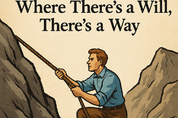
“Where There’s a Will, There’s a Way”
“Where There’s a Will, There’s a Way”(Also known unofficially as: “The Stubborn Person’s Superpower”) Origin and Historical EchoesThis tenacious truth goes back centuries, with roots in 17th-century English and beyond. It embodies the human spirit's favorite theme: persistence. The idea? Determination can bulldoze barriers. Even Roman philosopher Seneca echoed this when he said, “If one does not know to which port one is sailing, no wind is favorable.” Determination provides the direction—and creates the wind. Meaning and InterpretationThis isn’t just motivational fluff. It’s a battle cry for
- 관리자 기자
- 2025-07-09 07:43
-
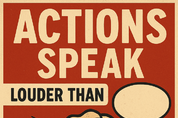
“Actions Speak Louder Than Words”
“Actions Speak Louder Than Words”(Also known unofficially as: “The Show-Don’t-Tell Principle of Life”) Origin and Historical EchoesWith roots as far back as the 1600s, this proverb likely came from sermons or speeches emphasizing morality and credibility. Even Confucius wrote: “A superior man is modest in his speech, but exceeds in his actions.” In short: talk is cheap. Do something. Meaning and InterpretationThis proverb reminds us that intentions mean little without follow-through. What you do—not what you say—defines your values, your integrity, and your impact. It’s a call to live your bel
- 관리자 기자
- 2025-07-09 07:42
-
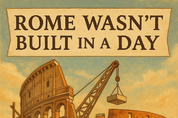
“Rome Wasn’t Built in a Day”
“Rome Wasn’t Built in a Day”Origin and Historical EchoesA medieval French proverb first popularized this idea, later translated into English in the 1500s. It captures one of life’s hard truths: Great things take time. Ancient Rome itself is the perfect metaphor—a sprawling city of innovation and beauty that rose over centuries, not sprints. Meaning and InterpretationThis proverb is a calm whisper amid our turbo-speed culture. It teaches patience, persistence, and the virtue of progress over perfection. Whether it’s building a city, a skill, or a self—it takes time. Applications in Education1.
- 관리자 기자
- 2025-07-09 07:40
-

“You Can’t Judge a Book by Its Cover”
“You Can’t Judge a Book by Its Cover”Origin and Historical EchoesThis proverb dates back to the mid-19th century, first appearing in the 1860s in George Eliot’s novel The Mill on the Floss. The metaphor is simple: appearances are deceiving. But the sentiment? Ancient. From Aesop’s fables to Confucian philosophy, wise folks everywhere warned against judging quickly. The outside rarely reveals the whole truth. Meaning and InterpretationThis phrase cautions against forming opinions based on looks, labels, or first impressions. That flashy book might be fluff. That plain one? A masterpiece. It rem
- 관리자 기자
- 2025-07-09 07:37
-
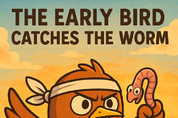
“The Early Bird Catches the Worm”
“The Early Bird Catches the Worm”(Also known unofficially as: “Team Sunrise’s Motto”) Origin and Historical EchoesThis cheerful nugget of advice first chirped its way into English in the 1600s and has stuck around like a morning rooster ever since. While no one knows the exact first tweet (pun intended), the phrase likely hatched from farmers’ wisdom and early-riser ethics common across agrarian societies. The message? Those who act first, win first. Even Roman wisdom reflects similar sentiment—consider “Audentes fortuna iuvat” (Fortune favors the bold). But the early bird doesn’t just get luc
- 관리자 기자
- 2025-07-09 07:33
-

Fair Play Menarini International Award, 29th Award Ceremony marked by waves of emotion
Fiesole, Italy, July 5, 2025 -- It was a night where history and legend intertwined, a time to honor the true values of ethics and fair play. The 29th Fair Play Menarini International Award ceremony took place at the Roman Theatre of Fiesole, a timeless space where culture and sports converge. The world's top sports stars, recognized for their exemplary loyalty, respect, and integrity both on and off the field, gathered together. Fair Play Menarini International Award 2025 This year's winners included Luis Figo, an icon of soccer. Luis Figo won the Ballon d'Or while playing for Real Madrid a
- 기자
- 2025-07-09 06:51
-
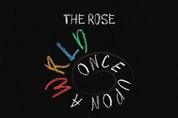
The Rose, the first Korean band to perform at Coachella, confirms Seoul concert on August 30 for “Once Upon a WRLD”
Alternative pop band The Rose is set to meet their domestic fans with the excitement of their global tour. The Rose (Kim Woo-sung, Park Do-joon, Lee Tae-gyeom, Lee Ha-joon) will hold a solo concert titled “Once Upon a WRLD” in Seoul on August 30 at Blue Square. The Rose will tour 27 cities worldwide through their 2025 World Tour “Once Upon a WRLD” in the second half of this year. The tour, which kicked off on June 9 in Zurich, Switzerland, and continued through Paris, London, Berlin, Seattle, LA, Washington D.C., Chicago, Toronto, New York, and Mexico City, has solidified its position as a sta
- 관리자 기자
- 2025-07-09 06:48
-
 Entertainment · Broadcasting
Fair Play Menarini International Award, 29th Award Ceremony marked by waves of emotion
Entertainment · Broadcasting
Fair Play Menarini International Award, 29th Award Ceremony marked by waves of emotion
-
 Entertainment · Broadcasting
The Rose, the first Korean band to perform at Coachella, confirms Seoul concert on August 30 for “Once Upon a WRLD”
Entertainment · Broadcasting
The Rose, the first Korean band to perform at Coachella, confirms Seoul concert on August 30 for “Once Upon a WRLD”
-
 Culture · Events
Incheon Port Authority kicks off the 6th Incheon International Marine Forum in Songdo, Incheon, to look into the future of the global marine industry
Culture · Events
Incheon Port Authority kicks off the 6th Incheon International Marine Forum in Songdo, Incheon, to look into the future of the global marine industry
-
 Culture · Events
Seocho Symphony Orchestra to hold performances in Berlin, Germany, and London, England, commemorating the 80th anniversary of liberation and the 75th anniversary of the Korean War
Culture · Events
Seocho Symphony Orchestra to hold performances in Berlin, Germany, and London, England, commemorating the 80th anniversary of liberation and the 75th anniversary of the Korean War
-
 Culture · Events
Gyeonggi Province to hold its largest job fair for middle-aged and older workers on the 9th. 1,000 jobs to be filled.
Culture · Events
Gyeonggi Province to hold its largest job fair for middle-aged and older workers on the 9th. 1,000 jobs to be filled.
-
 International
Jeju's soul resonates in Rome... Singing of the pain and reconciliation of Jeju 4·3
International
Jeju's soul resonates in Rome... Singing of the pain and reconciliation of Jeju 4·3
-
 International
Seoul City establishes a foothold for K-Beauty and fashion to enter the European market, promoting Milan as a base
International
Seoul City establishes a foothold for K-Beauty and fashion to enter the European market, promoting Milan as a base
-
 Medical · Health
Korean Centers for Disease Control and Prevention: Increase in hand, foot, and mouth disease among infants and young children! Follow preventive measures and maintain good hygiene to stay healthy.
Medical · Health
Korean Centers for Disease Control and Prevention: Increase in hand, foot, and mouth disease among infants and young children! Follow preventive measures and maintain good hygiene to stay healthy.
-
 Medical · Health
Korean Centers for Disease Control and Prevention: Injured patients account for the largest proportion of hospitalized patients; falls are the main cause
Medical · Health
Korean Centers for Disease Control and Prevention: Injured patients account for the largest proportion of hospitalized patients; falls are the main cause
-
 Medical · Health
WHO and international health experts visit Wanju local food production sites
Medical · Health
WHO and international health experts visit Wanju local food production sites
-
2026-01-29 23:44
11
-
2026-01-28 23:36
No. 6 Reporter
-
2025-12-09 14:30
Seong Ki-sun's Book Launch Event ‘Education in Turmoil’...Seeking Hope for Public Education Through Basic, Relationship, Growth (BRG)
-
2025-11-04 13:48
JP EDU - Hidden Opportunities in Japan: English-Taught International Studies Programs Open Doors to Prestigious Universities
-
2025-10-27 11:03
2026 대한민국영어신문 주니어 영어 기자단 모집





















